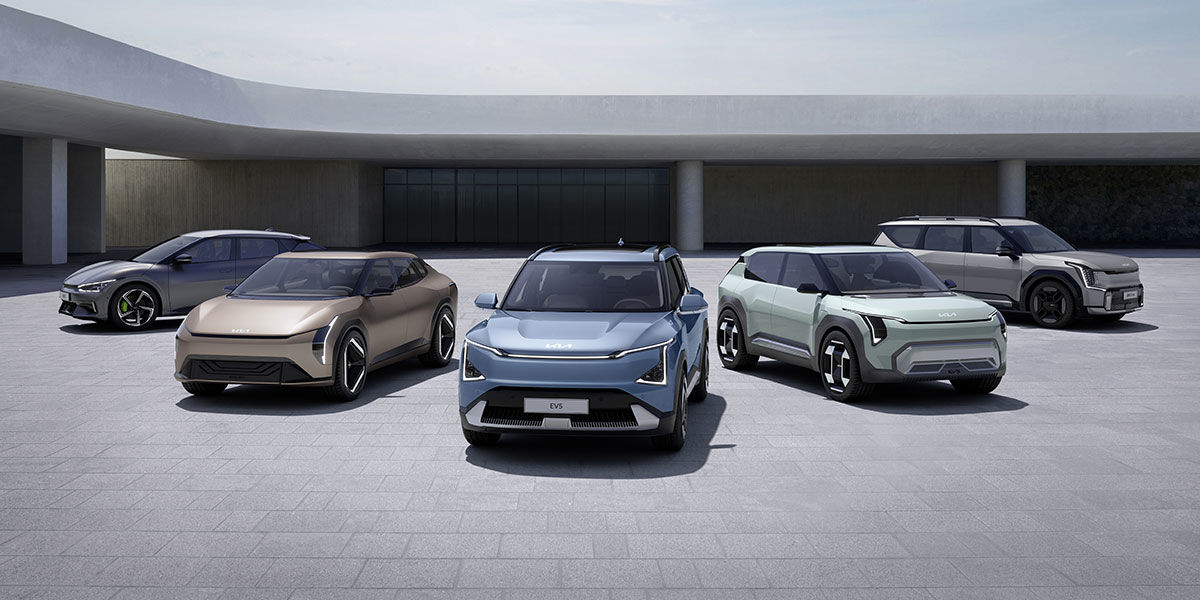Kia Fast-Tracks Electric Vehicle Revolution with EV5 Unveiling and Two Concept Models at Kia EV Day.
October 13 2023,
Opening Hours
October 13 2023,

-Kia reveals its global EV strategy at the annual 'EV Day', becoming a recurring event.
-Intensifying the 'EV revolution', Kia expands its lineup and boosts charging infrastructure.
-Kia introduces three new electric models, all falling within the small to medium-sized category.
-The Kia EV5: A compact SUV crafted as an electric solution for millennial families.
-The Kia Concept EV3: Envisions a practical and enjoyable driving experience in the form of an electric compact SUV.
-The Kia Concept EV4: Redefining electric sedans through the innovative 'Opposites United' design philosophy.
-Kia enhances customer interactions with an integrated app, offline hubs, and cutting-edge generative AI technology, promising an elevated experience.
Kia Corporation has unveiled three new compact to medium-sized electric models at its annual event, Kia EV Day in Korea. This move solidifies its bold global strategy to lead and accelerate the 'EV revolution'. The brand showcased its vision of 'EVs for all', outlining plans to significantly and rapidly expand its EV lineup. Building on the success of the EV6 and EV9, Kia is diversifying its offerings with three new models tailored for a broader audience.
The star of the show was the EV5, a compact electric SUV designed for millennial families. Kia also introduced two concept models: the Kia Concept EV3, aiming to deliver the benefits of the EV9 in a compact SUV, and the Kia Concept EV4, redefining electric sedans with a striking design. Alongside the vehicle lineup, Kia emphasized its EV strategy, focusing on enhancing customer convenience, reliability, and addressing common concerns such as charging infrastructure.
According to Ho Sung Song, President and CEO of Kia, the brand is committed to addressing customer hesitations about EV purchases. Kia plans to offer a comprehensive lineup of EVs at various price points and enhance the availability of charging infrastructure. As a sustainable mobility solutions provider, Kia views transitioning to electric vehicles as essential, not optional. Their goal is to provide unique value to as many people as possible through advanced EV technology, distinctive design, and intuitive services.
Kia also revealed plans to enhance customer experiences, including consolidating functions into a user-friendly smartphone app, introducing new services at physical locations, and providing in-vehicle artificial intelligence (AI) services. The aim is to make the entire customer journey, from digital to offline to in-vehicle interactions, effortless and enjoyable.
Charles Ryu, Head of Brand and Customer Experience Division, emphasized Kia's commitment to fulfilling customer needs through innovative digital platforms and technologies. Kia aims to offer more advanced sustainable mobility solutions that enhance people's lives. The brand's ambitious goal is to achieve annual sales of one million electric vehicles by 2026, with plans to increase it to 1.6 million units per year by 2030, driven by the latest products and initiatives announced.
Kia's Electric Vehicle (EV) Strategy: Broadening EV Lineup and Charging Infrastructure for Enhanced Accessibility
Kia has unveiled an ambitious plan to expand its electric vehicle offerings, ranging from $30,000 to $80,000, including popular models like EV6 and EV9. The strategy involves introducing smaller EVs like EV5, EV4, and EV3, priced between $35,000 and $50,000, to boost widespread EV adoption. In regions where EV uptake is slower, the initial focus will be on EV6 and EV9, followed by strategic releases of models such as EV5, EV4, and EV3, catering to diverse customer preferences.
To support this initiative, Kia is diligently working on establishing a robust EV production and battery supply system. The plan is to expand global EV production facilities to eight by 2025, covering research, development, production, and supply, with Korea serving as the central hub. Europe will focus on small and medium-sized EV production, while China will concentrate on mid to large-sized EVs. Additionally, specially designed EV models tailored for emerging markets will be manufactured in India. Kia is also establishing battery joint ventures to ensure a stable global battery supply system, aligning with its expanding EV production network.
This strategic move by Kia aims to not only diversify its product lineup but also facilitate the seamless adoption of electric vehicles worldwide.
Other Articles That May Interest You
March 27 2025,
Take a closer look at the 2022 Kia Forte GT Limited Package! This sporty sedan delivers a turbocharged engine, bold design, and premium features like leather seats, a sunroof, and advanced safety tech. Watch now to see why this compact sedan stands out!
March 26 2025,
The Canadian compact SUV market is about to experience a significant shift with Kia's latest announcement. The all-new 2026 Kia EV5, exclusive to the Canadian market in North America, aims to break down the affordability barrier in the electric vehicle segment while delivering the practical benefits Canadian drivers expect. This Canada-exclusive model represents a strategic move by Kia to...